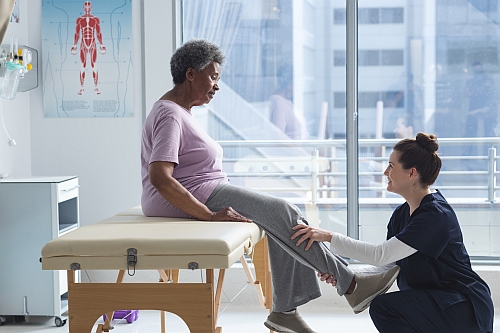Delayed Injury Symptoms After a Car Accident: What You Need to Know
Not all injuries show up right after a car accident. Some signs of damage appear later, often when the adrenaline wears off. These delayed injury symptoms can include neck pain, headaches, abdominal pain, or even signs of a traumatic brain injury. Ignoring them can lead to serious health problems. Knowing what to watch for and when to seek medical attention can make the difference between short-term discomfort and long-term complications.
In this blog, we explain the most common delayed injury symptoms after a car accident, why they are dangerous, how long they can take to appear, and why it is important to seek specialized car accident treatment with Georgia Spine & Orthopaedics in Atlanta.
Why Delayed Injury Symptoms Are So Dangerous
Some car accident injuries do not show symptoms right away. These delayed injury symptoms can cause serious problems if they go untreated.
The Body Masks Pain in Emergencies
After an auto accident, your body releases adrenaline. This natural stress hormone can block pain signals. As a result, physical symptoms may not appear until hours or even days later. This delay can lead people to ignore injuries that require medical attention.
Minor Symptoms Can Signal Serious Injuries
What starts as mild neck pain or a slight headache may be signs of spinal injuries or a traumatic brain injury. Ignoring early signs of discomfort can lead to complications. Symptoms such as numbness or tingling, constant headache, or shoulder pain may point to nerve damage or a neck injury caused by the crash.
Delayed Symptoms Often Worsen Over Time
Delayed pain can increase without proper medical treatment. Soft tissue injuries like muscle strain may turn into chronic pain if left untreated. Back injuries and joint injuries may limit movement and function. Internal injuries such as internal bleeding or damage to internal organs can become life-threatening.
Emotional and Cognitive Symptoms Are Easy to Miss
Not all delayed symptoms are physical. Mental and emotional changes like sleep disturbances, mood swings, difficulty concentrating, or emotional distress may appear after the event. These are signs of post traumatic stress disorder or mild traumatic brain injury. Psychological symptoms are often ignored, but they require care just like physical injuries.
Delay in Treatment Increases Health Risks
The longer someone waits to seek medical attention, the higher the chance of long-term damage. Conditions like a blood clot, neck and shoulder pain, or abdominal pain need early diagnosis. Proper medical treatment starts with a comprehensive medical examination by a trained medical professional.
Most Common Delayed Symptoms After a Car Accident
Some injury symptoms do not appear immediately after a car crash. These delayed symptoms can affect different parts of the body and may take hours, days, or even weeks to show.
Headaches and Brain Injuries
A headache after a crash may seem minor, but it can be a sign of a traumatic brain injury or mild traumatic brain injury. Other symptoms include blurred vision, memory loss, difficulty concentrating, and constant headache. These signs may also point to a blood clot or internal injuries that need immediate medical attention. Brain injuries can cause permanent damage if not diagnosed early.
Neck and Shoulder Pain
Neck and shoulder pain are common delayed symptoms. These may result from soft tissue injuries such as whiplash or muscle strain. Nerve damage can also cause numbness or tingling in the arms or hands. Neck pain may signal a serious neck injury caused by the force of the car accident. Pain can increase over time without proper medical care.
Back Pain and Spinal Injuries
Back injuries may not feel severe right away. Pain or stiffness in the lower back can appear later and may be linked to spinal injuries or joint injuries. Delayed back pain may also involve nerve compression or herniated discs. If left untreated, these conditions can lead to chronic pain and mobility problems.
Abdominal Pain and Internal Damage
Abdominal pain after a car accident should never be ignored. It may indicate internal bleeding, damage to internal organs, or a hidden blood clot. These internal injuries can be life-threatening. Other symptoms may include dizziness, low blood pressure, and bruising. A comprehensive medical examination is needed to detect hidden trauma.
Psychological Symptoms
Emotional and mental changes are common after a car accident. Delayed symptoms can include mood swings, sleep disturbances, and emotional distress. Some people experience signs of post-traumatic stress disorder, including flashbacks and anxiety. These psychological symptoms can affect daily life and should be taken as seriously as physical injuries.
Numbness, Tingling, or Weakness
Delayed nerve-related symptoms may include numbness, tingling, or muscle weakness. These signs often result from spinal injuries or nerve compression. These symptoms can progress and lead to loss of strength or sensation if not treated early by a medical professional.
How Long Can Delayed Symptoms Take to Show Up?
Delayed injury symptoms from a car accident may not appear right away. Some signs can take hours, days, or even weeks to develop.
Within the First 24 Hours
Some symptoms may begin shortly after the accident. These can include neck pain, shoulder pain, back pain, or tension headaches. Even if these symptoms feel mild, they may signal soft tissue injuries or spinal injuries. Immediate medical attention during this window can help identify hidden damage early.
Several Days After the Accident
Many common delayed injury symptoms appear within a few days. These may include abdominal pain, numbness or tingling, and emotional changes like mood swings or sleep disturbances. Neck and shoulder pain can increase during this period, especially if linked to whiplash or nerve damage. It is important to follow up with a medical professional even if symptoms seem minor.
One to Two Weeks Later
Some injury symptoms, especially psychological symptoms, may take longer to appear. Signs of post traumatic stress disorder such as emotional distress, difficulty concentrating, or changes in sleep patterns may develop during this time. Other physical symptoms like joint pain or chronic pain from muscle strain can also worsen over one to two weeks. These injuries often require physical therapy or long-term care.
Longer-Term Symptoms
In some cases, injury symptoms appear weeks after the auto accident. Nerve damage, back injuries, or complications from internal injuries may take time to become noticeable. A delayed blood clot or slow internal bleeding can cause serious health risks if left untreated. This is why early diagnosis and ongoing medical evaluation are important.
The Importance of Immediate and Specialized Medical Attention
Delayed injury symptoms may seem small at first, but waiting to get care can lead to long-term problems. Getting proper medical treatment quickly helps prevent serious health issues.
Delayed Symptoms Can Hide Serious Injuries
Some car accident injuries are not immediately obvious. Internal bleeding, soft tissue injuries, or mild traumatic brain injuries may not show signs until hours or days later. Neck pain, shoulder pain, or abdominal pain can signal more serious injuries under the surface. A comprehensive medical examination is needed to find these hidden problems.
Early Diagnosis Prevents Complications
Getting a medical evaluation soon after a car accident allows doctors to detect delayed symptoms early. This helps prevent injuries from getting worse. Spinal injuries, nerve damage, and joint injuries can often be managed with physical therapy or minor treatment if caught in time. Delayed care increases the chance of chronic pain or permanent damage.
Specialized Care for Spine and Orthopedic Injuries
Georgia Spine & Orthopaedics in Atlanta provides expert care for car accident injuries. Their team focuses on diagnosing and treating neck injuries, back injuries, and soft tissue damage. They use advanced imaging and testing to find the root cause of symptoms. Early treatment leads to better recovery and lower long-term medical expenses.
Accident Care Requires More Than Emergency Room Visits
Emergency rooms check for life-threatening injuries, but they often miss delayed injury symptoms. Many car accident injuries require follow-up care with a specialist. Neck and shoulder pain, muscle injuries, and spinal trauma need more detailed attention than most ERs provide. Georgia Spine & Orthopaedics offers that level of focused care.
Take Action Before Symptoms Get Worse
If you’ve been in a car accident, do not wait for symptoms to appear or worsen. The team at Georgia Spine & Orthopaedics is experienced in diagnosing and treating delayed injury symptoms, including spinal injuries, soft tissue damage, and nerve-related conditions.
Schedule an appointment with us today at 678-929-4494!






